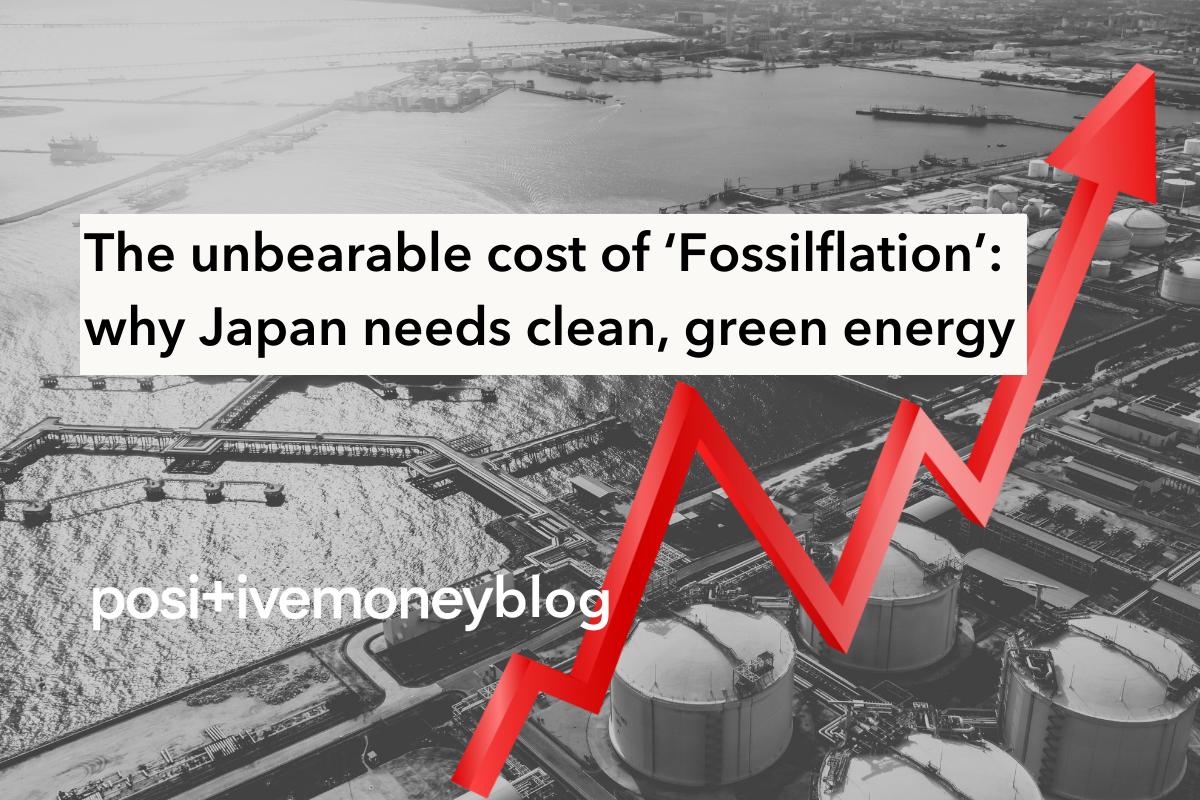
The future of moneyGlobal
2 December 2025
Japan's reliance on fossil-based energy is straining households and making the transition to a sustainable and decarbonised society more challenging. Transitioning to renewable energy could stabilise living costs and reduce inflationary pressures while also aligning Japan with its climate goals.
Although Japan's inflation rate is still relatively low compared to other countries after the COVID-19 pandemic, it has been facing inflation for the first time in a few decades, hitting a peak of 4.3% in January 2023. Why? A big part of the answer is fossilflation.
Consumer price inflation: Annual % change in consumer price index
Fossilflation is a chronic symptom of a fossil fuel-dependent society, which clearly calls for all countries to rapidly transition away from fossil fuels. It describes how increases in the cost of fossil fuels cause price rises in many other sectors, goods and services of the economy, as they all depend on fossil fuels to be produced.
The global economic recovery after the pandemic undeniably triggered a surge in energy costs. Prices also rocketed following Russia’s invasion of Ukraine. Additionally, instability in the Middle East, both this year and in previous decades, has posed further spikes and uncertainty about energy prices. Japan, with its heavy reliance on imported goods and services—especially privatised fossil-based energy sources—is particularly vulnerable to these internal and external inflation factors. That is fossilflation in a nutshell.
While it is worth noting that the yen's depreciation is another key factor causing inflation in Japan, its dependence on fossil fuels cannot be overstated. 84.8% of Japan’s total energy supply is made up of coal, oil, and fossil gas. But Japan does not have many domestic sources of fossil fuels and so has to rely on imports for approximately 95% of its primary energy demand. Japan also relies on fossil fuels to generate its electricity - 63.9% to be precise. Hence, the price of imported energy is a critical inflationary factor for Japanese people and the economy.
The volatility of fossil fuel prices is sometimes human-made/designed, such as wars and the Organisation of Petroleum Exporting Countries’ (OPEC+) decision to cut oil production. Price spikes are also caused by natural events, which themselves are on the rise, given the growing climate crisis. (See more on Climateflation here) For example, this year, the US experienced an unprecedented hurricane season. Several hurricanes hit the Gulf Coast, where many liquefied natural gas (LNG) export terminals are located, taking the LNG infrastructure offline. The gas price fell 5% on 9th September but jumped around 7% two weeks later. The National Oceanic and Atmospheric Administration has warned that the US will experience more than double the number of Category 3 or stronger hurricanes before the end of this year, with warmer sea surface temperatures due to global warming cited as a key factor.
Meanwhile, Japan has increased its LNG imports from the US by 8% over the past decade while reducing imports from the Middle East by 18% to diversify its energy supply. However, Japan is concerned about price volatility in US LNG exports, as seen in its reaction to the Biden Administration's pause on LNG export permits.
25% of Japan’s overall inflation rate is driven by electricity prices, most of which are generated by fossil fuels. And this increase in energy prices will hit those on lower incomes harder since “poor households spend a higher share of their incomes on energy”. Without fundamental change fast, Japan will be exposed to even higher prices due to a volatile imported fossil fuel market, and the poorest people will bear most of the burden.
Weekly average of daily average wholesale JPEX power price in JPY per kWh, spot market 'system prices' (weighted by transaction volume)
To try and tackle price instability, the Japanese government introduced energy subsidies in January 2022 to control gasoline prices, initially intended as a short-term measure but now reportedly extended until March 2025. However, the Board of Audit of Japan has questioned the effectiveness of retail price controls. The government also began subsidising household utility bills in January 2023 to ease the burden of high electricity prices. This initially ended in May 2024 but, after being reintroduced for a limited period as emergency assistance during the summer heat wave of 2024, they will be reintroduced again. Altogether, the government has already spent JPY 10 trillion on these measures, and approximately JPY 1 trillion will be spent on extension and reintroduction.
While these measures saw short-term success in lowering inflation by 0.5%, they do not address the root cause of inflation - our high dependence on fossil fuels. Moreover, these measures risk bolstering the profits of private fossil fuel companies, such as retailers and prolonging - rather than ending - our reliance on fossil fuel-based electricity. The government should instead shift focus toward investing in domestically produced, clean, green energy to ensure stable prices and a sustainable future for people and the planet.
Moreover, lowering the price of fossil fuel-based energy with subsidies is completely contrary to the government's climate commitment to reach net zero by 2050. The amount spent on subsidies in the past two years is more than half of the public funds allocated for the next ten years' decarbonisation plan through the Climate Transition Bonds. Fossil fuel subsidies not only worsen the trade deficit, which is mainly caused by the cost of imported fossil fuels but also disincentivise the transition toward renewable energy.
In 2023, almost 60% of people were already struggling with the cost of living. To bring down prices and help millions both today and for years to come, Japan must transition away from fossil fuels - the core issue of the fossilflation- and towards a more sustainable economy. An increase in Japanese renewable energy will reduce its exposure to volatile fossil fuel markets, leading to more stable and affordable energy for households and businesses.
Japan’s new Prime Minister Ishiba has already acknowledged the global 1.5-degree target in his new coalition government agreement, and is currently working on Japan’s seventh strategic energy plan. The rapid expansion of clean, green energy is an obvious first step to achieving both, and we’ll be watching closely.
Kentaro Nunokawa is a campaign fellow at Positive Money and full-time Japan Energy Campaigner at Market Forces. Ken has been actively involved in climate campaigns in Japan with particular focus on engagement with Japanese corporations, financial institutions, and investors. Ken holds a degree in Arts and Sciences, majoring in Peace Studies, from International Christian University and an MA in Political Ecology from Universitat Autònoma de Barcelona.
__
Sign-up to our mailing list for regular updates, or donate to support our work to redesign our economic system for social justice and a liveable planet.
